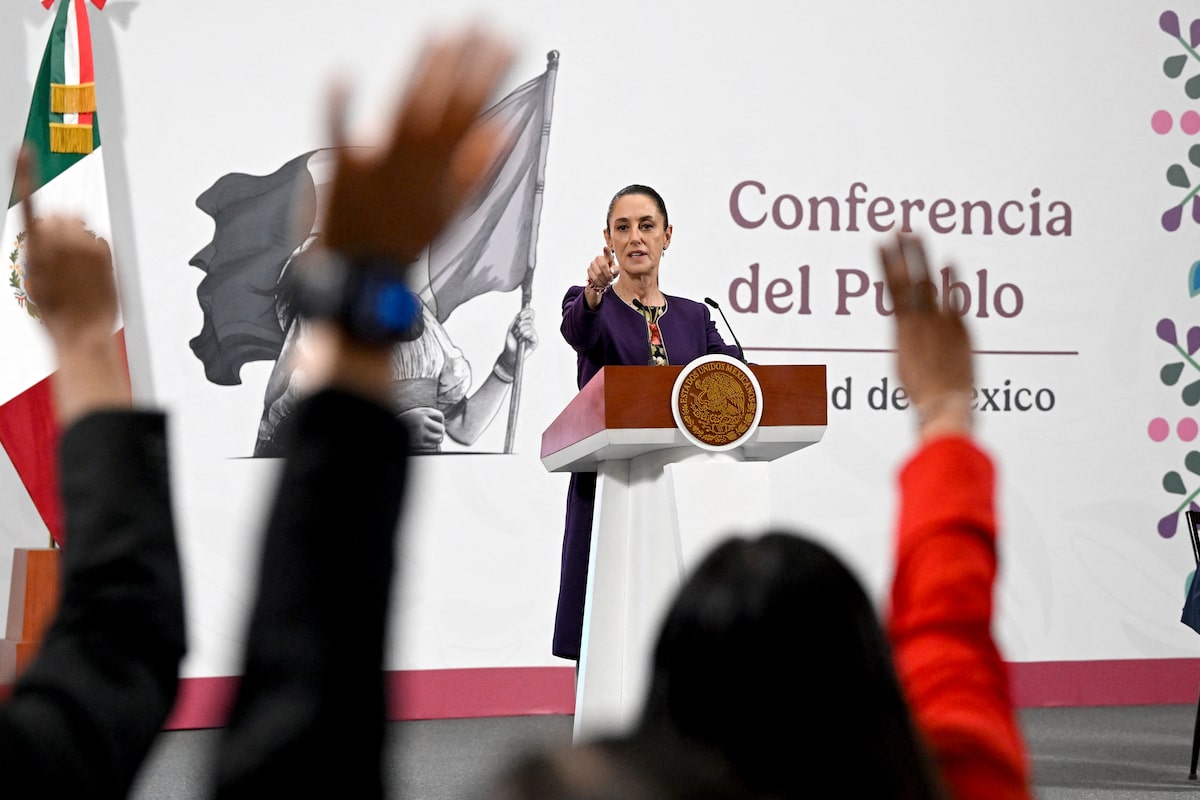Mexico’s President Claudia Sheinbaum at a Mexico City press conference in July, 2025. Mexico was granted a 90-day extension to its trade talks with the U.S.ALFREDO ESTRELLA/AFP/Getty Images
Finance Minister François-Philippe Champagne and Foreign Affairs Minister Anita Anand are heading to Mexico City this week to hold bilateral meetings with government officials, just days after both countries failed to reach trade agreements with the U.S. by an Aug. 1 deadline set by President Donald Trump.
The senior cabinet ministers are also expected to meet with Mexican President Claudia Sheinbaum, according to two sources familiar with the planning.
The Globe and Mail is not identifying the sources because they are not authorized to speak publicly about the discussions.
The two days of talks, which will tackle trade and the broader relationship between the countries, begin Tuesday. The discussions are taking place at a time when Mr. Trump’s trade actions and rhetoric have raised questions about the future of the United States-Mexico-Canada Agreement and free trade generally.
With never-ending tariff drama, the Canadian economy limps along
After intensive talks between Ottawa and Washington did not reach a trade agreement by the deadline, the United States raised the blanket tariffs that Mr. Trump imposed on Canadian goods in March to 35 per cent from 25 per cent.
These tariffs do not apply to products that meet the rules of origin outlined in the USMCA, which has allowed most Canadian exports to continue crossing the border tariff-free.
Mexico, however, was granted a 90-day extension to continue trade talks, without the U.S. immediately increasing tariffs.
The extension was attributed by some to Mexico’s quiet diplomacy with the United States. It has stood in contrast with Canada’s more combative reaction, which includes some countertariffs.
Despite the setback, Canada is continuing to negotiate with the Trump administration to achieve some level of trade certainty.
On Sunday, Dominic LeBlanc, the minister responsible for U.S.-Canada trade, told CBS News’s Face the Nation that he expects Prime Minister Mark Carney and Mr. Trump to speak “over the next number of days.”
Mr. LeBlanc said there’s a great deal of common ground with the U.S., and that he believes a deal to bring down tariffs is still possible.
Carney says Ottawa is disappointed with raised 35% U.S. tariffs, remains committed to USMCA
Trade talks with U.S. to continue over coming weeks, LeBlanc says
He also said the country is encouraged by recent conversations with U.S. Commerce Secretary Howard Lutnick and U.S. Trade Representative Jamieson Greer, but “we’re not yet where we need to go to get the deal that’s in the best interest of the two economies.”
On Friday, Mr. LeBlanc told The Globe in an interview from Washington that a new deal in the short term isn’t likely. He said he will be speaking to Mr. Lutnick this coming week, and that the two will meet in person later in August.
Mr. Carney and Ms. Sheinbaum spoke last month, with the Mexican President saying the two leaders had agreed to strengthen trade collaboration.
She said at the time that she had agreed with Mr. Carney that the USMCA, signed during Mr. Trump’s first presidency, needed to be respected. Ms. Sheinbaum said they had also discussed strategies for negotiating with the Trump administration.
Mr. Carney said in a statement released Friday that Canada remains committed to the USMCA trade pact.
Goldy Hyder, the president and CEO of the Business Council of Canada, said in an interview Sunday that the meetings in Mexico City are significant and are likely to be a warm-up act to a later visit by Mr. Carney himself.
Trade Minister Maninder Sidhu eyes new markets outside U.S., looks at Southeast Asia and beyond
He also said Mexico represents “low-hanging fruit” for Canada’s diversification strategy. Often, businesses think about Europe and Asia as potential new markets, but he said there are many opportunities for the countries to work together for each other’s economic security.
Canada and Mexico are both democracies that believe in fair trade, he said, adding that deepening those ties sends an important statement.
Mexico is identified as a priority market for Export Development Canada, which says the country is considered Canada’s third most important trading partner and its top export destination in Latin America. At the end of last year, B.C. announced that it would establish a trade office in Mexico as part of the province’s push to diversify trade.
Mr. Trump has justified tariffs for Canada and Mexico because he says he wants the countries to do more to address illegal smuggling of the opioid fentanyl. The President has used this argument to impose broad-based levies by declaring a “national emergency” on the border.
Canada’s fentanyl czar Kevin Brosseau (right) and Denver, a Canada Border Services Agency narcotics detection dog.Spencer Colby/The Canadian Press
New fentanyl data undercut White House’s portrayal of Canada’s role in U.S. drug crisis
Canada has maintained that Mr. Trump’s allegations about fentanyl trafficking are false, but it has boosted spending on the border in recent months, and put a fentanyl “czar” in place, Kevin Brosseau, a former RCMP deputy commissioner.
Mr. LeBlanc said Friday that his team continues to stress to Americans steps Canada is already taking to combat fentanyl, and that the amount crossing from Canada to the U.S. is minuscule.
“I’m confident that the fentanyl justification can be worked through with the Americans,” he said.
With reports from Steven Chase, Stephanie Levitz, David Agren and Andrea Woo

